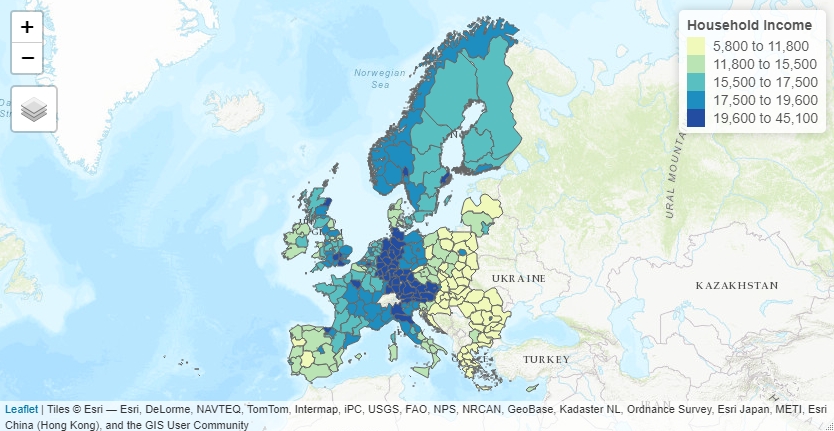
Using R to draw and visualize data on maps with different libraries.
Github link: https://github.com/MNoorFawi/drawing-maps-with-r
ggmap
suppressMessages(library(caret))
suppressMessages(library(dplyr))
suppressMessages(library(ggmap))
data("Sacramento")
## stamen map
scrmnt <- c(left = min(Sacramento$longitude),
bottom = min(Sacramento$latitude),
right = max(Sacramento$longitude),
top = max(Sacramento$latitude))
get_stamenmap(scrmnt, maptype = "watercolor") %>% ggmap() +
ggtitle("Sacramento City")
Sacramento$price_in_thousands <- round(Sacramento$price / 1000)
qmplot(longitude, latitude, data = Sacramento,
maptype = "toner-lite",
color = price_in_thousands) + scale_color_viridis_c()
## GOOGLE map
register_google("your_google_api_key")
sacramento_map <-
get_googlemap(
center = c(
lon = mean(Sacramento$longitude),
lat = mean(Sacramento$latitude)
),
zoom = 10,
maptype = "satellite"
) %>%
ggmap(extent = "device")
sacramento_map + geom_point(
aes(x = longitude, y = latitude,
color = price_in_thousands),
data = Sacramento,
alpha = 0.5,
size = 2
) +
scale_color_viridis_c() +
ggtitle("House Prices in Sacramento") +
theme(legend.position = "top",
legend.direction = "horizontal")
dev.off()
## To convert a df to sf
# sacramento <- st_as_sf(Sacramento, coords = c("longitude", "latitude"),
# crs = "+proj=longlat +datum=WGS84 +no_defs")
#sacramento <- st_cast(sacramento, "MULTIPOINT")
tmap
suppressMessages(library(eurostat))
tgs00026 <- get_eurostat("tgs00026", time_format = "raw")
## Table tgs00026 cached at C:\Users\noor\AppData\Local\Temp\Rtmpk5pbY7/eurostat/tgs00026_raw_code_TF.rds
head(tgs00026)
## # A tibble: 6 x 6
## unit direct na_item geo time values
## <fct> <fct> <fct> <fct> <chr> <dbl>
## 1 PPS_HAB BAL B6N AT11 2006 19000
## 2 PPS_HAB BAL B6N AT12 2006 19800
## 3 PPS_HAB BAL B6N AT13 2006 20000
## 4 PPS_HAB BAL B6N AT21 2006 18500
## 5 PPS_HAB BAL B6N AT22 2006 18600
## 6 PPS_HAB BAL B6N AT31 2006 19300
tgs00026$country <- substr(as.character(tgs00026$geo), 1, 2)
## getting geometry
eurostat_geodata <- suppressMessages(get_eurostat_geospatial()[, 7:8])
## Household income in 2016
tgs_rom <-tgs00026[tgs00026$time == "2016",]
## merging with geometry
tgs_map <- merge(x = eurostat_geodata, y = tgs_rom, by = "geo")
## interactive view mode
tmap_mode("view")
tm_shape(tgs_map) + tm_polygons(col = "values",
palette = "YlGnBu",
title = "Household Income",
style = "quantile")
## Household change rate in Italy 2006 - 2016
tgs00026_06_it <- tgs00026[tgs00026$time == "2006" &
tgs00026$country == "IT",]
tgs00026_16_it <- tgs00026[tgs00026$time == "2016" &
tgs00026$country == "IT",]
tgs00026_16_it$delta <-
100 * (tgs00026_16_it$values - tgs00026_06_it$values) /
tgs00026_06_it$values
suppressMessages(library(tmap))
tmap_mode("plot")
## tmap mode set to plotting
tgs_it_map <- merge(x = eurostat_geodata, y = tgs00026_16_it, by = "geo")
tm_shape(tgs_it_map) +
tm_fill(
col = "delta",
palette = "RdBu",
title = "Household\nChange (%)",
style = "quantile"
) +
tm_borders(alpha = 0.6)
Geospatial Storytelling with tmap R
data("World", "metro", package = "tmap")
metro$gr <- 100 * ((metro$pop2020 - metro$pop2010) / metro$pop2010)
tm_shape(World) + tm_polygons(col = "income_grp",
palett = "-Blues",
title = "Income") +
tm_text(text = "iso_a3", size = "AREA") +
tm_shape(metro) +
tm_bubbles(
size = "pop2020",
title.size = "Est. Metropolitan Population \nin 2020",
col = "gr",
title.col = "2010-2020 Population \nGrowth (%)",
palette = "-RdYlBu",
border.col = "black",
border.alpha = 0.5,
style = "quantile"
)






Leave a Reply